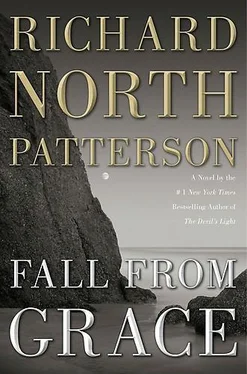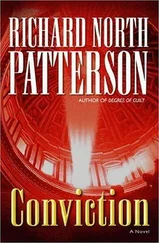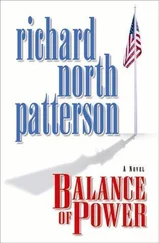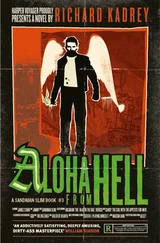Richard Patterson - Fall from Grace
Здесь есть возможность читать онлайн «Richard Patterson - Fall from Grace» весь текст электронной книги совершенно бесплатно (целиком полную версию без сокращений). В некоторых случаях можно слушать аудио, скачать через торрент в формате fb2 и присутствует краткое содержание. Жанр: Триллер, на английском языке. Описание произведения, (предисловие) а так же отзывы посетителей доступны на портале библиотеки ЛибКат.
- Название:Fall from Grace
- Автор:
- Жанр:
- Год:неизвестен
- ISBN:нет данных
- Рейтинг книги:5 / 5. Голосов: 1
-
Избранное:Добавить в избранное
- Отзывы:
-
Ваша оценка:
- 100
- 1
- 2
- 3
- 4
- 5
Fall from Grace: краткое содержание, описание и аннотация
Предлагаем к чтению аннотацию, описание, краткое содержание или предисловие (зависит от того, что написал сам автор книги «Fall from Grace»). Если вы не нашли необходимую информацию о книге — напишите в комментариях, мы постараемся отыскать её.
Fall from Grace — читать онлайн бесплатно полную книгу (весь текст) целиком
Ниже представлен текст книги, разбитый по страницам. Система сохранения места последней прочитанной страницы, позволяет с удобством читать онлайн бесплатно книгу «Fall from Grace», без необходимости каждый раз заново искать на чём Вы остановились. Поставьте закладку, и сможете в любой момент перейти на страницу, на которой закончили чтение.
Интервал:
Закладка:
“Because it might bring him a couple more months while being virtually undetectable-no hair loss, no hole in the skull, and, most important, no loss of sexual potency. In turn, I made him sign a letter stating that he was rejecting all other treatment options with full knowledge of the consequences.”
Reaching into his sport coat, Zell took out a copy of the letter and laid it on the table. Adam stared down at the signature that had graced countless books-“Benjamin Blaine.” The bold letters, slanting forward, bespoke vigor and aggression, as distinctive as his father’s face in profile. For an instant, Adam saw him piloting his sailboat, as clear as though it were yesterday. “Were there side effects?” he asked.
“A few. A potential drop in white blood cells, weakening the immune system. They also would have caused him to bruise more easily-not to the touch, but if he bumped into something or someone.”
At once, Adam thought of the pathology report George Hanley refused to give him. “So if someone struck him, or gripped him with any kind of force, bruises would reflect that?”
The look Zell gave him was curious. “I’d think so, yes.”
“How long did you expect him to live?”
“At a guess? About as long as he did live, deteriorating steadily toward the end. All of which I told him.”
“Then let me ask you a critical question. In discussing his refusal to seek more aggressive treatment, did my father seem rational to you?”
Zell folded his hands in front of him, gazing at a slice of morning sunlight that had appeared on the corner of the table. “It’s not the course I’d take, but I can’t say that it’s flat crazy. He wanted to be the man he was for as long as he could. ‘If I get to the point where I’m not,’ he told me, ‘I’ll know what to do.’”
Surprised again, Adam asked, “Suicide?”
“He wasn’t explicit. But that was implied, I thought.”
Adam tried to imagine his father, powers flagging, deciding to end his life in his favorite place and on his favorite day, the summer solstice. Then he gazed at the date of the letter, a little over five months before. “By the end, how would you expect this disease to affect him?”
“There are a variety of possibilities. Worsening headaches. Problems speaking or remembering words. Visual deficits. Impaired coordination-”
“Could it have caused him to fall off that cliff?”
“Might have. His balance could have been compromised. He might have had a seizure, or blacked out. He could even have had a stroke.”
“My mother says he’d stumble, or forget words. She thought it was drinking.”
“Maybe,” Zell allowed. “But just as likely it was the tumor spreading. Did your mother mention mood changes?”
“Yes. That he was much more volatile and erratic.”
“No surprise. As it grew, the tumor could affect areas of the brain that govern reasoning, self-control, and comprehension.”
Adam looked Zell in the face. “And the capacity to execute a will?”
“It could,” Zell said, with obvious reluctance. “But a medical opinion requires ‘a reasonable degree of medical certainty.’ Without having seen him further, all I’d have is the MRI and, eventually, the pathologist’s report. Only a charlatan would opine on his mental fitness to execute a valid will.”
Adam felt discouraged and angry at once. “There’s an irony here, Doctor. It seems likely that, by refusing treatment, my father increased the likelihood of mental impairment. Even as he made it impossible for you to ascertain that.”
Zell gave him a sympathetic look. “I understand. For my own part, having Benjamin Blaine as a patient was one of the most disheartening aspects of my career. I’m confronted with this vigorous, talented man, and all my training tells me I could extend his life, and its quality. But he focused on the possible effects of treatment, not the inevitable effects of the disease. And, of course, on secrecy.”
“How so?”
“One of his imperatives was that I tell his doctor nothing. Your father shared Dr. Gertz with your mother, he told me, and he didn’t want to burden Gertz with keeping secrets. He said he’d tell her when it was right.”
“He never did,” Adam said bluntly. “Instead, he stole her future.”
Zell tilted his head. “I have to wonder if he told Carla Pacelli. Of all people, she might be the last person he’d want to see him as a dying man.”
Adam considered this possibility, trying to fit it into the puzzle of Carla’s involvement in the will. “Then let me ask you something else,” he said. “Was my father as you perceived him capable of ending his own life?”
Zell gave an incredulous smile. “You tell me.”
“That would be difficult,” Adam replied. “I hadn’t seen or spoken to him in a decade. To borrow a phrase, having Benjamin Blaine as a father was one of the most disheartening aspects of my life.”
Zell stared at him. “As an amateur psychologist,” he said at length, “I think your father was capable of anything he set his mind to. If he thought living a day longer would diminish how people saw him, he might have thrown himself off a cliff.” He paused. “Your father had an elemental force, and palpable strength of will. One thing I’m pretty sure of is that I’d never want to be in his way.”
“You wouldn’t, Doctor. That much I can tell you.”
Quiet, Zell gazed out the window, watching the hotel doorman hail a taxi. “Your father had a very strong idea of himself,” he said at last. “Maybe, as you suggest, he lost his powers of reason. But it’s at least as likely that the last months of his life-Carla Pacelli, the will, his haste to finish a book, even his final moments-had to do with how he accommodated his self-concept to the reality of imminent death.” Zell paused, then concluded simply, “Your father finally met something he couldn’t beat. But that doesn’t mean he wouldn’t die trying.”
Eight
A bumpy flight later, at twelve fifteen, Adam entered the law office of Ted Seeley on Main Street in Vineyard Haven. Unlike Edgartown, this had always been a place for working people, full-time residents of the island, and taking an office here seemed a shrewd choice for a newly arrived practitioner. But the office itself, on the second floor above a defunct restaurant, suggested a threadbare practice-the reception area was cramped, with cheap furniture and cheaper wood paneling; a fiftyish receptionist perched by a phone that did not ring; a cubbyhole where a younger woman perused a paltry selection of legal documents; and a closed door, slightly warped, behind which Ben’s lawyer was doing something or nothing. Adam tried to imagine seeing the office through his father’s eyes.
The receptionist buzzed Seeley. When he burst through the door with an aura of energy and goodwill, Adam formed a first impression-a slight, thirtyish man with flaxen hair, a too-eager smile, and small, calculating eyes. Adam sensed his calculations were short-term. From Seeley’s offices, the wolf was pawing the door.
Seeley gave him a firm handshake. “Great to meet you, Adam. Can I get you some coffee?”
The fervor of this greeting, Adam thought, was pitched too high: no doubt this man was chary of the missing son who, in the words of his father’s will, “had the courage to hate,” and whose mother Seeley had helped to disinherit. “No, thanks,” Adam said coolly. “Let’s get to it. Do you have the time sheets I requested?”
Seeley’s smile faded. He ushered Adam into his office, shut the door behind him, motioned Adam to a wing chair with faded upholstery, and handed him a pile of documents purporting to show the time spent preparing Benjamin Blaine’s last will. Adam took brief stock of the windowless office, the shelves holding treatises on the staples of a small-town general practice: divorce, real estate, wills and trusts. Then he perused the lists of activities-client meetings, document review, legal research, drafting, execution-Seeley had undertaken to cement Clarice’s ruin. The name Carla Pacelli appeared nowhere.
Читать дальшеИнтервал:
Закладка:
Похожие книги на «Fall from Grace»
Представляем Вашему вниманию похожие книги на «Fall from Grace» списком для выбора. Мы отобрали схожую по названию и смыслу литературу в надежде предоставить читателям больше вариантов отыскать новые, интересные, ещё непрочитанные произведения.
Обсуждение, отзывы о книге «Fall from Grace» и просто собственные мнения читателей. Оставьте ваши комментарии, напишите, что Вы думаете о произведении, его смысле или главных героях. Укажите что конкретно понравилось, а что нет, и почему Вы так считаете.












